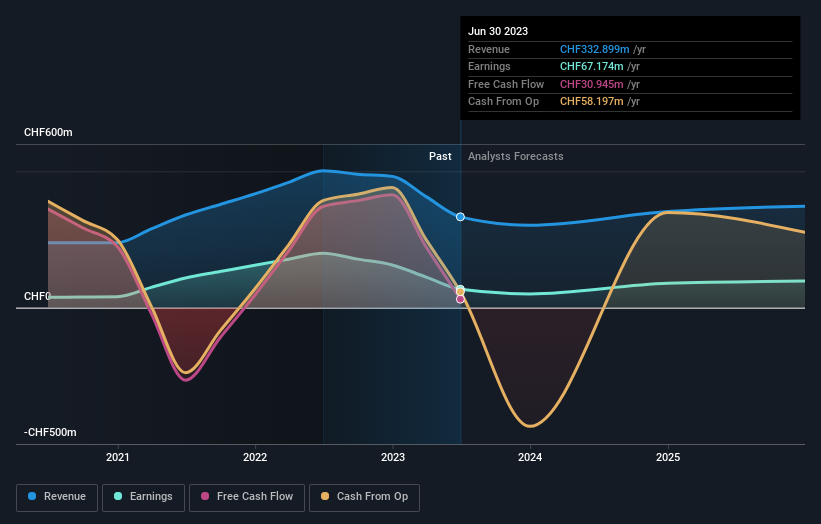Retail investors among Leonteq AG's (VTX:LEON) largest shareholders, saw gain in holdings value after stock jumped 9.2% last week
Key Insights
The considerable ownership by retail investors in Leonteq indicates that they collectively have a greater say in management and business strategy
A total of 4 investors have a majority stake in the company with 52% ownership
To get a sense of who is truly in control of Leonteq AG (VTX:LEON), it is important to understand the ownership structure of the business. We can see that retail investors own the lion's share in the company with 34% ownership. Put another way, the group faces the maximum upside potential (or downside risk).
As a result, retail investors collectively scored the highest last week as the company hit CHF734m market cap following a 9.2% gain in the stock.
Let's take a closer look to see what the different types of shareholders can tell us about Leonteq.
See our latest analysis for Leonteq
What Does The Institutional Ownership Tell Us About Leonteq?
Institutions typically measure themselves against a benchmark when reporting to their own investors, so they often become more enthusiastic about a stock once it's included in a major index. We would expect most companies to have some institutions on the register, especially if they are growing.
Leonteq already has institutions on the share registry. Indeed, they own a respectable stake in the company. This suggests some credibility amongst professional investors. But we can't rely on that fact alone since institutions make bad investments sometimes, just like everyone does. If multiple institutions change their view on a stock at the same time, you could see the share price drop fast. It's therefore worth looking at Leonteq's earnings history below. Of course, the future is what really matters.
We note that hedge funds don't have a meaningful investment in Leonteq. Raiffeisen Gruppe is currently the largest shareholder, with 31% of shares outstanding. Meanwhile, the second and third largest shareholders, hold 8.7% and 7.5%, of the shares outstanding, respectively. Lukas Ruflin, who is the second-largest shareholder, also happens to hold the title of Chief Executive Officer.
Our research also brought to light the fact that roughly 52% of the company is controlled by the top 4 shareholders suggesting that these owners wield significant influence on the business.
Researching institutional ownership is a good way to gauge and filter a stock's expected performance. The same can be achieved by studying analyst sentiments. There is some analyst coverage of the stock, but it could still become more well known, with time.
Insider Ownership Of Leonteq
While the precise definition of an insider can be subjective, almost everyone considers board members to be insiders. The company management answer to the board and the latter should represent the interests of shareholders. Notably, sometimes top-level managers are on the board themselves.
Most consider insider ownership a positive because it can indicate the board is well aligned with other shareholders. However, on some occasions too much power is concentrated within this group.
Our information suggests that insiders maintain a significant holding in Leonteq AG. Insiders own CHF89m worth of shares in the CHF734m company. We would say this shows alignment with shareholders, but it is worth noting that the company is still quite small; some insiders may have founded the business. You can click here to see if those insiders have been buying or selling.
General Public Ownership
With a 34% ownership, the general public, mostly comprising of individual investors, have some degree of sway over Leonteq. While this size of ownership may not be enough to sway a policy decision in their favour, they can still make a collective impact on company policies.
Private Company Ownership
It seems that Private Companies own 31%, of the Leonteq stock. It's hard to draw any conclusions from this fact alone, so its worth looking into who owns those private companies. Sometimes insiders or other related parties have an interest in shares in a public company through a separate private company.
Next Steps:
I find it very interesting to look at who exactly owns a company. But to truly gain insight, we need to consider other information, too. For example, we've discovered 3 warning signs for Leonteq (1 makes us a bit uncomfortable!) that you should be aware of before investing here.
If you would prefer discover what analysts are predicting in terms of future growth, do not miss this free report on analyst forecasts.
NB: Figures in this article are calculated using data from the last twelve months, which refer to the 12-month period ending on the last date of the month the financial statement is dated. This may not be consistent with full year annual report figures.
Have feedback on this article? Concerned about the content? Get in touch with us directly. Alternatively, email editorial-team (at) simplywallst.com.
This article by Simply Wall St is general in nature. We provide commentary based on historical data and analyst forecasts only using an unbiased methodology and our articles are not intended to be financial advice. It does not constitute a recommendation to buy or sell any stock, and does not take account of your objectives, or your financial situation. We aim to bring you long-term focused analysis driven by fundamental data. Note that our analysis may not factor in the latest price-sensitive company announcements or qualitative material. Simply Wall St has no position in any stocks mentioned.

 Yahoo Finance
Yahoo Finance 

